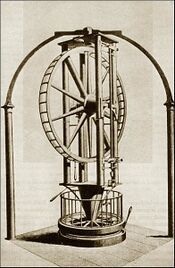Template:Are You Sure/October 6: Difference between revisions
No edit summary |
No edit summary |
||
| Line 1: | Line 1: | ||
[[File:Palermo Ramsden telescope.jpg|link=|175px|thumb|The 5-foot diameter Palermo circle manufactured by '''[[Jesse Ramsden (nonfiction)|Jesse Ramsden]]''' to measure apparent positions of astronomical objects.]] | [[File:Palermo Ramsden telescope.jpg|link=|175px|thumb|The 5-foot diameter Palermo circle manufactured by '''[[Jesse Ramsden (nonfiction)|Jesse Ramsden]]''' to measure apparent positions of astronomical objects.]] | ||
• ... that mathematician and scientific instrument maker '''[[Jesse Ramsden (nonfiction)|Jesse Ramsden]]''' produced instruments for astronomy that were especially well known for maritime use, where they were needed for the measurement of latitudes, and for his surveying instruments which were widely used for cartography and land survey; and that quality and accuracy of his instruments established his reputation as the most able instrument maker in Europe for the next forty years until his death in 1800? | • ... that mathematician and scientific instrument maker '''[[Jesse Ramsden (nonfiction)|Jesse Ramsden]]''' produced instruments for astronomy that were especially well known for maritime use, where they were needed for the measurement of latitudes, and for his surveying instruments, which were widely used for cartography and land survey; and that quality and accuracy of his instruments established his reputation as the most able instrument maker in Europe for the next forty years until his death in 1800? | ||
• ... that philosopher '''[[Thomas Reid (nonfiction)|Thomas Reid]]''' believed that common sense (in a special philosophical sense of ''sensus communis'') is, or at least should be, at the foundation of all philosophical inquiry, and that the foundations upon which our ''sensus communis'' are built justify our belief that there is an external world? | • ... that philosopher '''[[Thomas Reid (nonfiction)|Thomas Reid]]''' believed that common sense (in a special philosophical sense of ''sensus communis'') is, or at least should be, at the foundation of all philosophical inquiry, and that the foundations upon which our ''sensus communis'' are built justify our belief that there is an external world? | ||
• ... that mathematician '''[[Benjamin Peirce (nonfiction)|Benjamin Peirce]]''' introduced the terms ''idempotent'' and ''nilpotent'' in 1870 to describe elements of associative algebras? | • ... that mathematician '''[[Benjamin Peirce (nonfiction)|Benjamin Peirce]]''' introduced the terms ''idempotent'' and ''nilpotent'' in 1870 to describe elements of associative algebras? | ||
Revision as of 04:56, 6 October 2020

• ... that mathematician and scientific instrument maker Jesse Ramsden produced instruments for astronomy that were especially well known for maritime use, where they were needed for the measurement of latitudes, and for his surveying instruments, which were widely used for cartography and land survey; and that quality and accuracy of his instruments established his reputation as the most able instrument maker in Europe for the next forty years until his death in 1800?
• ... that philosopher Thomas Reid believed that common sense (in a special philosophical sense of sensus communis) is, or at least should be, at the foundation of all philosophical inquiry, and that the foundations upon which our sensus communis are built justify our belief that there is an external world?
• ... that mathematician Benjamin Peirce introduced the terms idempotent and nilpotent in 1870 to describe elements of associative algebras?
